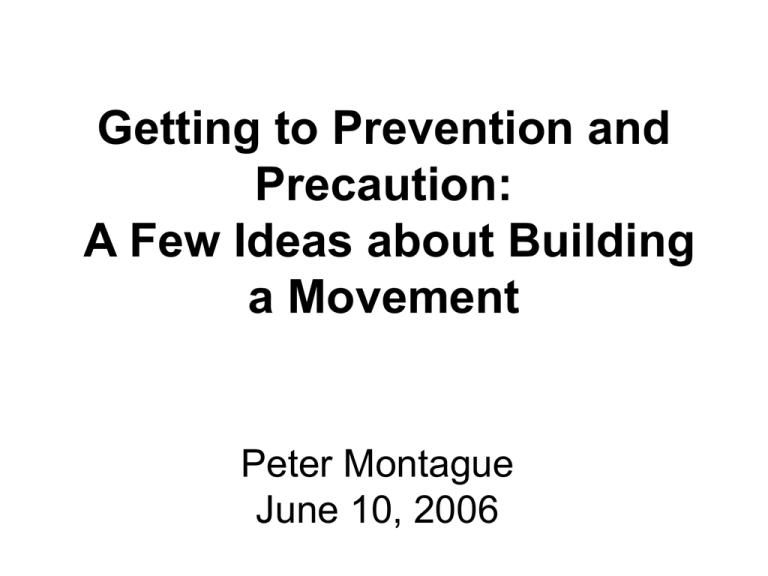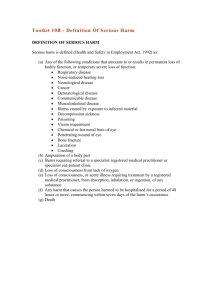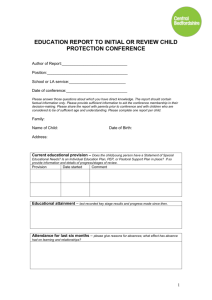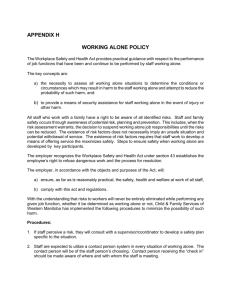Getting to Prevention and Precaution: A Few Ideas about Building a Movement
advertisement

Getting to Prevention and Precaution: A Few Ideas about Building a Movement Peter Montague June 10, 2006 1. The problem • What we’ve got on our hands is a system that cannot prevent harm • Skip Spitzer of Root Action describes it as a “structure of harm” Confronting the structure of harm demands that we THINK BIG Corporations are pervasive, powerful entities compelled to (a) seek narrow self-interest (b) produce economic concentration (c) externalize social and environmental harms (d) create perpetual growth. The mass media, public relations, science, education, and the culture of consumption and wealth reflect and reinforce the structure of harm. The structure of harm is projected internationally by economic, military, political and cultural means. Intolerance, patriarchy, white privilege, and white supremacy feed upon, and are fed by, the corporate system The government supports the structure of harm by protecting corporate interests because of (a) corporate influence ($), and (b) the need for economic growth Together all these factors produce, support and maintain the structure of harm. 2. But times are ripening for deep change • The end of cheap oil is here, or soon will be • Global warming and water shortages are real • Ecological limits are real (no place left to throw stuff “away”, for example) • Many families are living with major insecurity (wages stagnant, good jobs disappearing, health costs soaring, the children’s future uncertain) • More and more, people are living with chronic illnesses • The social safety net is being shredded • The corporate system is beset by multiple crises and this is creating opportunities for thinking about new ways of living and being in the world • The world is getting primed for a precautionary approach, a new way of thinking and being (a “new” way that is really ancient, as Oren Lyons reminded us yesterday) 3. Building a movement • History tells us that deep change is possible; every system can be challenged and changed. But it requires a social movement to make it happen. What is a movement? A social movement is a joining of campaigns, associations, organizations, and coalitions that share a common vision and overall goals, symbols, and information, plus a tremendous sense of solidarity • We’ve got what it takes • We outnumber our adversaries at least 2 to 1 and often by far more • All our adversaries have going for them is “divide and rule.” • Therefore, to alter the structure of harm, we need to get together and stay together • If our adversaries fail to divide us, the game is over for them Successful movements engage the major sectors of society – workers, women, students, youth, intellectuals and others sharing a common set of grievances The grievances we share are: (a) the social and environmental harms needlessly and stupidly created by the structure of harm and (b) the denial of opportunity to choose other paths by democratic means. A successful movement to modify the structure of harm will be multi-issue, international, diverse and democratically inclusive, aiming for class, race, and gender justice, and environmental, economic, and social sustainability • A successful movement to alter the structure of harm will seek fundamental change. • “Greening” the structure of harm will not alter the structure (though it may still be desirable). This raises an important issue that every movement faces: Reform or Transform? • Do we stick with short-term winnable goals, or do we aim to transform the structure of harm? • One answer is, We can aim to do both at the same time. • We can reframe our local issues so they reveal the nature of the system that gave rise to them. Finding Allies • Many of us work on “environmental health,” but people working on dozens of other issues are using, or could use, a preventive approach. • All of them (and more) could be allied in a movement (See partial list at end of handout.) • Instead of expecting them to join US, we can join THEM • Each of our groups could appoint an ambassador whose job it is to search out new allies To broaden our appeal, we can include the 3 environments in all our work: 1. The natural environment (air, water) 2. The built environment (sprawl, highways, brownfields) 3. The all-important social environment (low income, social exclusion, insecurity, stress, sexism, racism) We can help build a prevention and precaution movement by developing state or regional groups (“larger than local”) to help with organizing, training, leadership development, and getting hold of resources Stable communities require a “precautionary economics” that aims to prevent job loss by developing local businesses that are rooted in communities. We can hook up with groups that are focused on local economic revitalization to create jobs and stabilize communities. 4. Developing a common vision and agenda As Yogi Berra once said, “If you don’t know where you’re going, you might not get there.” The structure of harm rests on the assumption of perpetual growth in material production, which is impossible on a finite planet. So something new is needed. What will it look like and feel like? The whole system is set up to convince us that “There is No Alternative” (TINA) But we can describe many alternatives that already exist in the U.S. now. (For examples, see Alperovitz, America Beyond Capitalism.) Eventually we can develop a foundational economic/political agenda that systematically addresses the underlying issues of corporate power, an economic system that requires perpetual growth, and a hollowed-out democracy. As smartMeme reminds us, We can develop a story-based strategy for changing the culture, with sympathetic characters that personalize issues, engage people’s values, foreshadow the future, and help people see themselves working and living in a new world. A precautionary goal • From 1765 to 1865 activists in England and the U.S. made slavery repugnant and unthinkable • We can make it repugnant and unthinkable to make decisions without asking, “How little harm can we do?”



